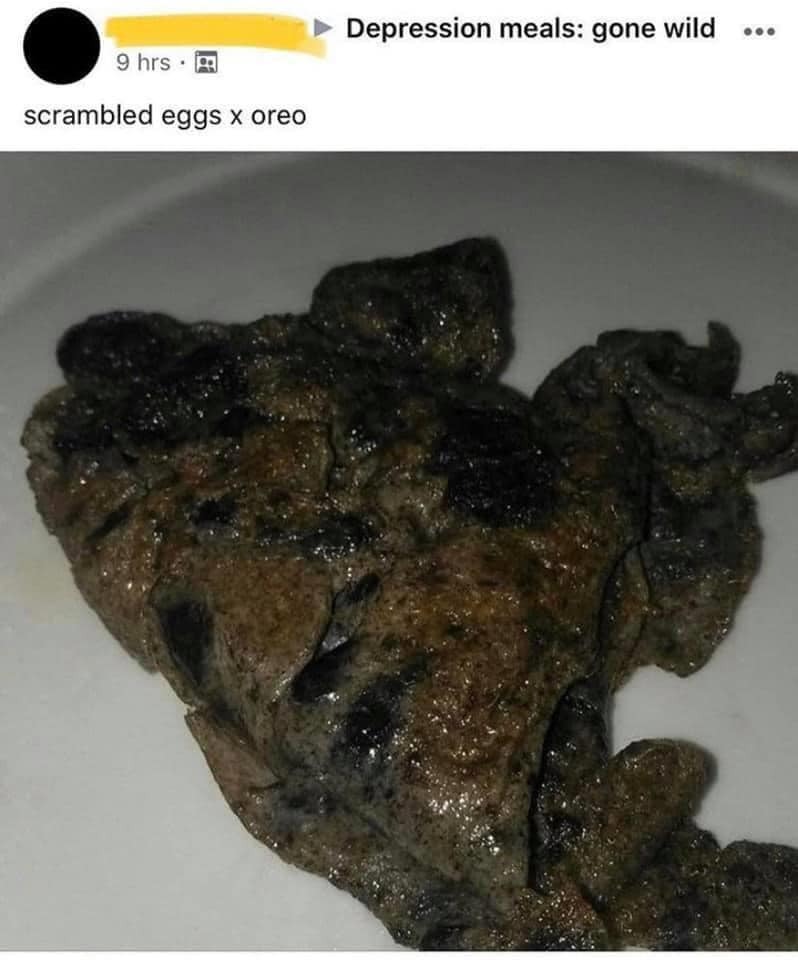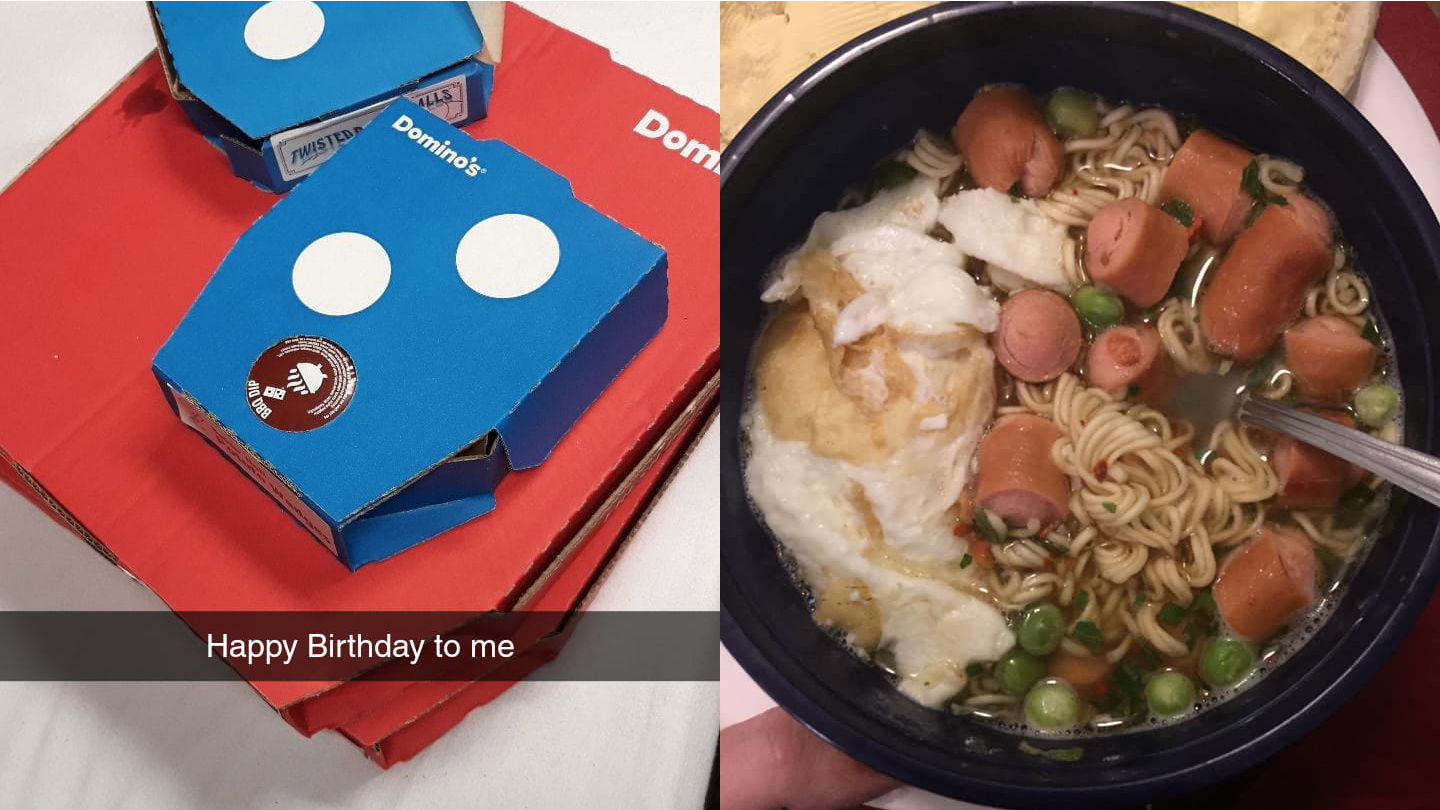Hot dog risotto. Pickles, Oreos, and scrambled eggs with ketchup. A lasagne sandwich. No, these aren’t fake, cursed recipes from @boyswhocancook — these are real meals posted in Depression meals: Gone Wild, a Facebook group with over 107,000 members.
The concept of the depression meal — comforting, often bizarre food combinations that are easy to put together when mental health means it’s too taxing to create a nutritious, ‘normal’ meal — is perhaps as old as depression itself. Even Sylvia Plath wrote down some pretty chaotic food combinations in her diary, like “two doughnuts, orange juice, rhubarb, milk, and two cups of coffee”. Depression meals will look different for everyone (my go-to has always been a Margherita pizza topped with chips), but the vibe behind them is usually the same: they’re low-effort, comforting, and, more often than not, chaotic. Think microwavable mac and cheese with a side of raw cucumber. Think ten slices of jam and toast. Think Quorn nuggets and gravy. This is the food that has brought together the members of Depression Meals: Gone Wild.
The Facebook community is primarily a place for people to post their most cursed ‘depression meals’, but it’s also a way to bond over mental health, and feel less alone in our own personal coping mechanisms. Created back in 2017 by political commentator Richard Medhurst, the group is now largely run by a small team of mods, like Kay. These mods curate content that helps people realise that “everybody is in a similar boat” when it comes to the mammoth task of feeding yourself when depressed, Kay explains. “There are people who feel uncomfortable with what they eat, or feel shame, but this group is a way to help.”
That’s certainly the case for 23-year-old Ramona*, who suffers from depression and anxiety and has been a member of the group since 2018. “My favourite depression meal is an entire raw carrot chopped and mixed with a tin of tuna,” Ramona says. She posts in the group sporadically, mainly whenever she’s particularly struggling with her mental health. “I did a post on my birthday in 2019, which was not a great time,” she recalls. “My family was in another country and I wasn’t able to see my friends.” Ramona’s post, featuring boxes of Domino’s pizza and a caption explaining her unfortunate situation, received 40 comments from people wishing her a happy birthday and expressing their sympathies.

“I also did a post asking about Crockpot recipes which got quite a few responses,” Ramona continues. “I think people are interested in sharing what they know.” Ramona’s request was met with comments offering up recipes for everything from chili to soup. “It was really useful when I was in a rough place,” she says of the comforting recipe suggestions.
For others, like 35-year-old EJ, the go-to depression meal is more simple than that. “I like rice cakes,” they say. “It’s really easy to just put something on them, even if it’s just butter. Sometimes I like to be really boujee and put smoked salmon on there as a little treat.” A Depression Meals: Gone Wild member for a couple of years, EJ has been on antidepressants since they were 15 and also has suspected ADHD, autism and chronic anxiety. They’ve found comfort in the group’s non-judgemental community.
“It’s been a ride,” they say of their mental health journey. “I have posted in the group pretty recently actually – I made myself a bowl of ramen with fried egg and bits of chopped up hotdog in it,” they say. “Which is the scummiest version of ramen you can probably think of, but quite a few people said that it actually looked pretty good.”
It’s perhaps no surprise that depression meals are A Thing given that changes in appetite and a lack of energy are two common symptoms of depression. Psychologist Lilly Sabir explains that the hormonal imbalance caused by depression “can cause a crash and burn effect,” which is why depression often impacts our eating habits. “Because our bodies feel emotionally hijacked by the instability produced by our hormones, our minds and bodies will look for the closest thing that allows it to bring joy,” Lilly says. “We need that dopamine kick, even if it’s for a second, to feel we are surviving. So some of us turn to food to provide this emotional nourishment for us.”
So what do mental health professionals, like Lilly, make of a Facebook group like Depression Meals: Gone Wild? “Studies show those who suffer from overeating or undereating can find these types of support groups useful,” Lilly says of the community. “However there is evidence to demonstrate that with some conditions, like anorexia nervosa for example, group-led interventions can create a ‘competition’ effect for some, and that can worsen their symptoms.” This is indisputably true: pro-ana content continues to thrive online and even in ‘safe’ spaces like Depression Meals: Gone Wild, subtly triggering content can go undetected.
And the mods themselves acknowledge that the group, while well-intentioned, has its pitfalls. “With a group as big as 100,000 people there’s sure to be a few stragglers in there who try to make the place negative,” Kay offers. “But we don’t tolerate that at all.” At least in a closely moderated group like Depression Meals: Gone Wild, where posts have to be approved by mods before being made public, overtly triggering or harmful content is much rarer than it is on other social media platforms. On the whole, it seems as though the mods and members of Depression Meals: Gone Wild encourage and engender intuitive, rather than restrictive, eating.
Registered nutritionist and ACT therapist Pixie Turner believes that belonging to a group like Depression Meals: Gone Wild can actually be beneficial. “I can see how it may help someone feel less alone,” she says. “Shame thrives in secrecy, and sharing something like this with the world can help to reduce that shame.”
That’s certainly the experience of the group members we spoke to for this piece. Both Ramona and EJ speak highly of the strength of the community. “I’ve always found that misery loves company,” EJ explains. “So it’s kind of nice that we can all laugh about the fact that [with depression] your eating habits go to shit — whether it’s overeating, comfort eating, or eating things that aren’t even really a balanced meal or snack.”
Pixie Turner agrees that there’s value in sharing depression meals, especially when there’s so much stigma surrounding more unorthodox eating habits. “I think we can become fixated on this idea of ‘healthy’ and ‘unhealthy’ when food should always be context-dependent,” she says. “I think it’s worth considering that, in that moment, this is what is healthy for someone, especially if it’s helping them get through the day.”
While clearly there will always be rogue members and posts, and while online communities like this cannot replace psychological help, groups like Depression Meals: Gone Wild obviously do have a place in normalising and instituting support structures for those suffering from poor mental health. At the very least, it can help reframe depression meals as radical acts of self-care. As Pixie says: “I think we often fixate so much on the long-term benefits of eating nutritious food, that we forget there is no long-term without getting through the short-term.”
*Name has been changed. Follow i-D on Instagram and TikTok for more on mental health.



